Ways to Develop Cooperative Culture in Early Childhood
VerifiedAdded on 2022/12/22
|11
|3004
|50
AI Summary
This article discusses the ways to develop a cooperative culture among children, colleagues, parents, and professionals in early childhood. It also explores strategies for managing change and reflects on personal values and systems for future learning and goals.
Contribute Materials
Your contribution can guide someone’s learning journey. Share your
documents today.
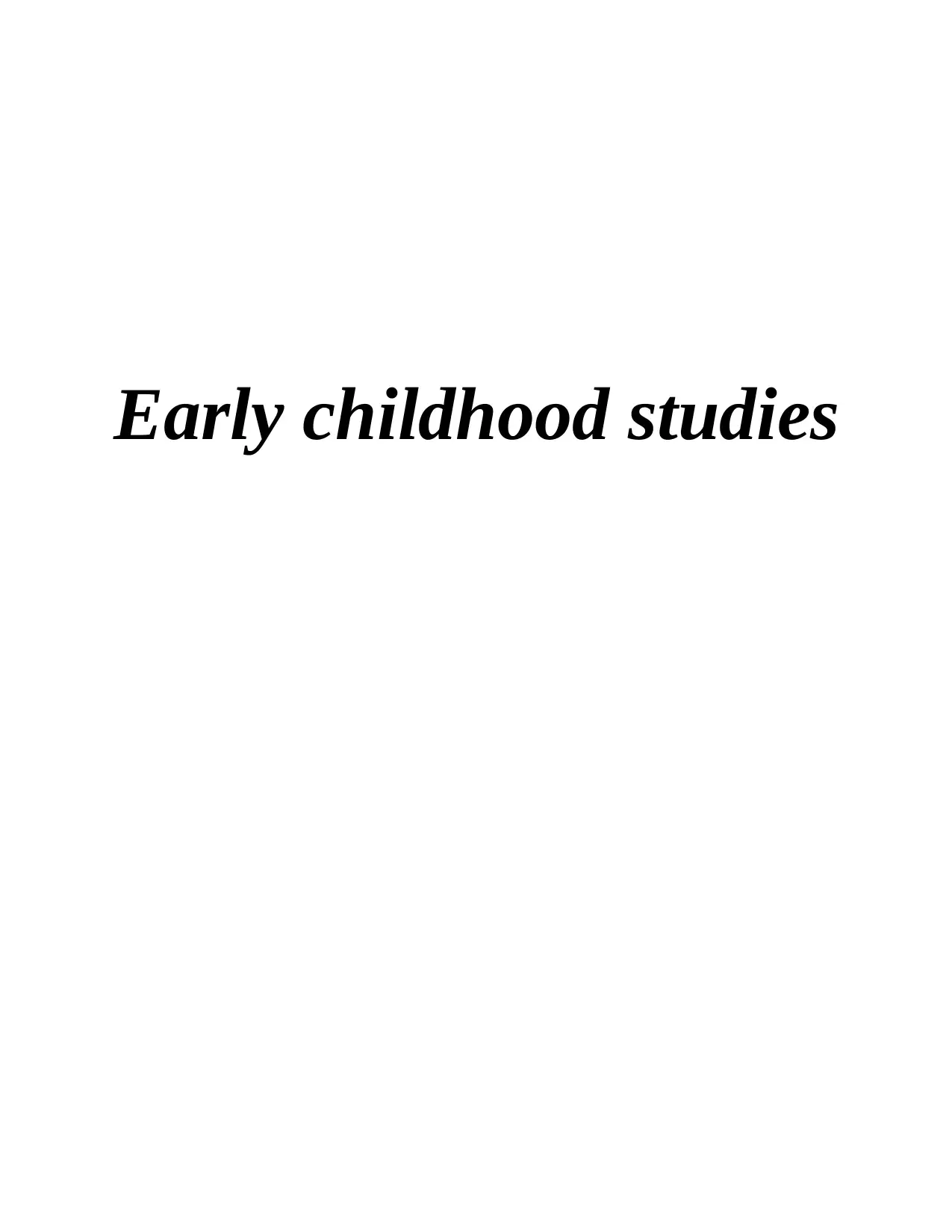
Early childhood studies
Secure Best Marks with AI Grader
Need help grading? Try our AI Grader for instant feedback on your assignments.
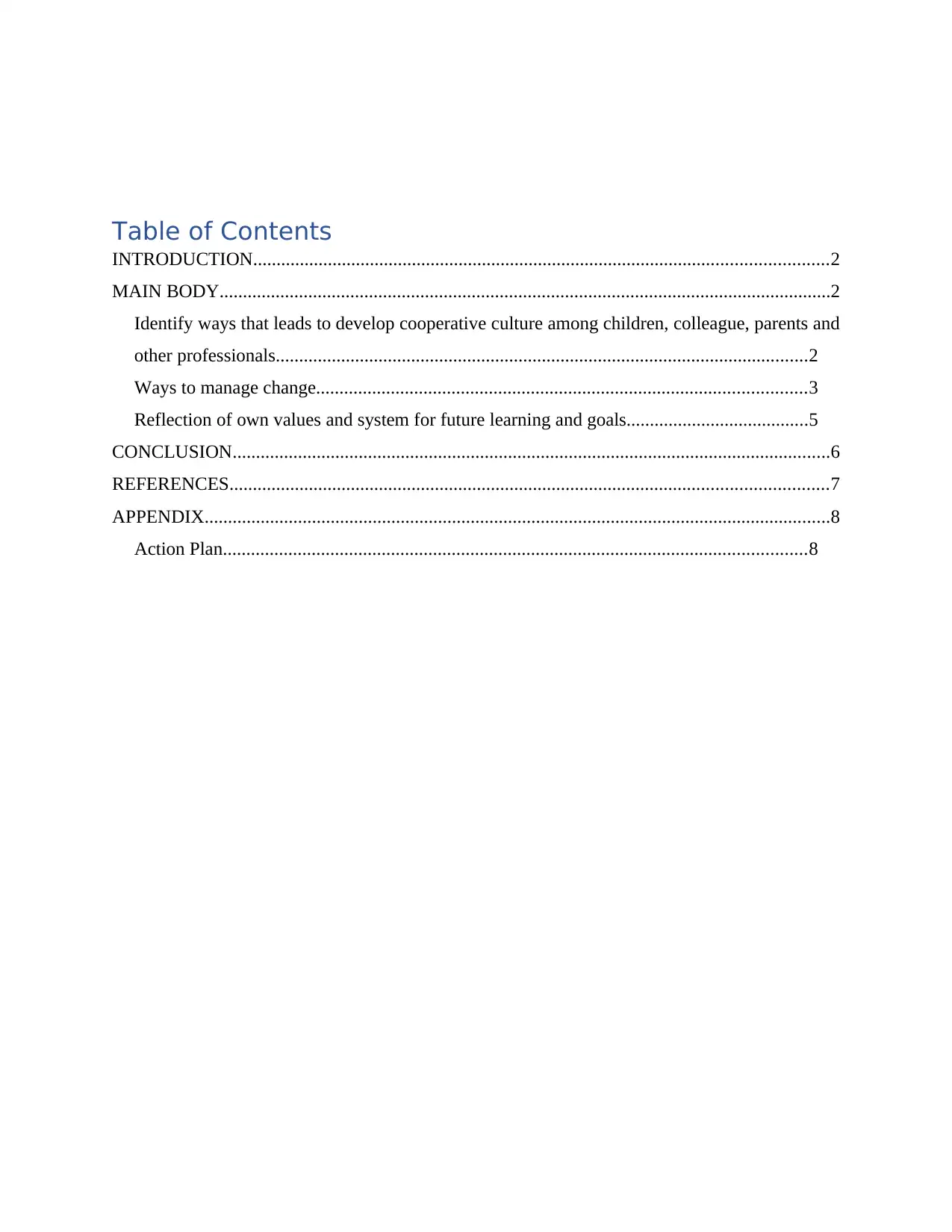
Table of Contents
INTRODUCTION...........................................................................................................................2
MAIN BODY...................................................................................................................................2
Identify ways that leads to develop cooperative culture among children, colleague, parents and
other professionals..................................................................................................................2
Ways to manage change.........................................................................................................3
Reflection of own values and system for future learning and goals.......................................5
CONCLUSION................................................................................................................................6
REFERENCES................................................................................................................................7
APPENDIX......................................................................................................................................8
Action Plan.............................................................................................................................8
INTRODUCTION...........................................................................................................................2
MAIN BODY...................................................................................................................................2
Identify ways that leads to develop cooperative culture among children, colleague, parents and
other professionals..................................................................................................................2
Ways to manage change.........................................................................................................3
Reflection of own values and system for future learning and goals.......................................5
CONCLUSION................................................................................................................................6
REFERENCES................................................................................................................................7
APPENDIX......................................................................................................................................8
Action Plan.............................................................................................................................8
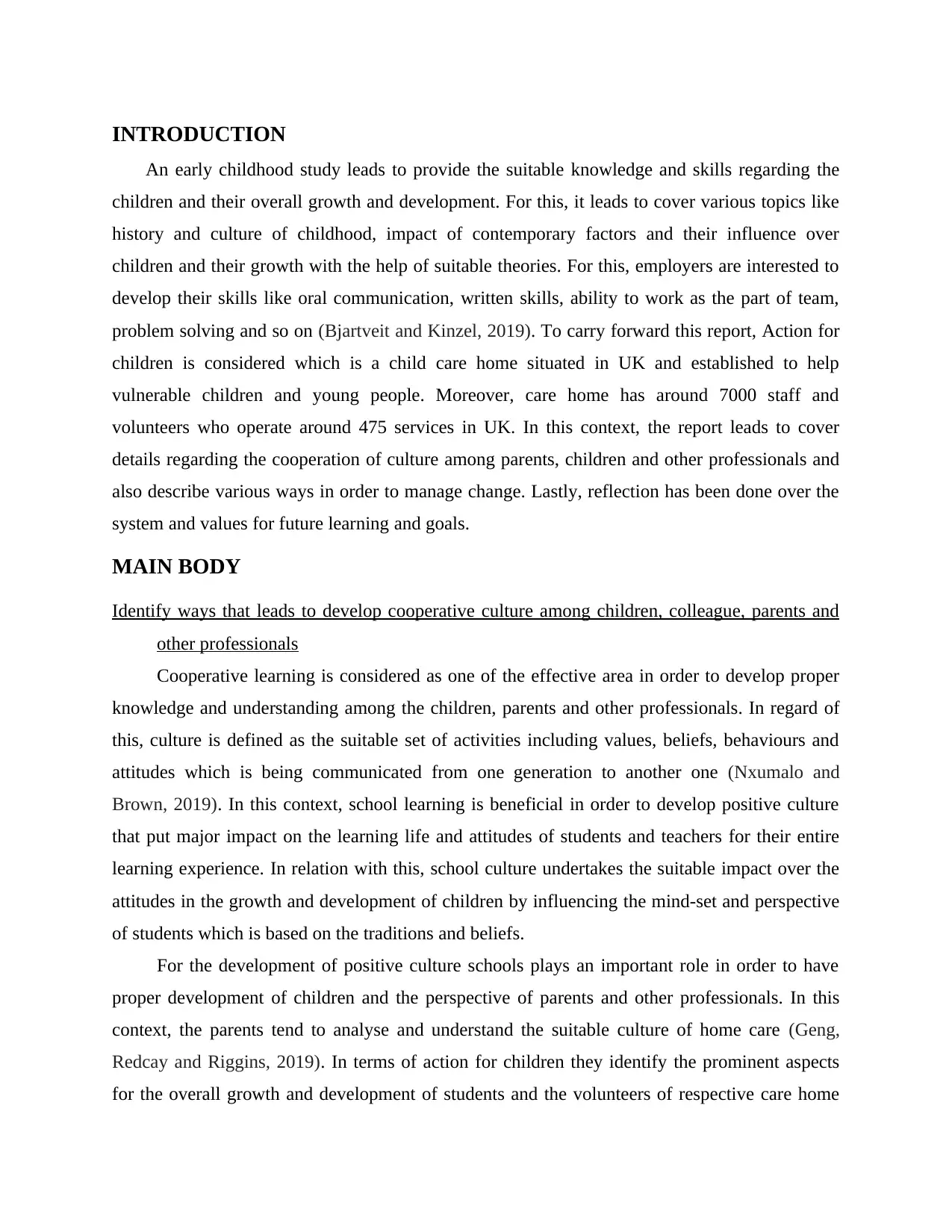
INTRODUCTION
An early childhood study leads to provide the suitable knowledge and skills regarding the
children and their overall growth and development. For this, it leads to cover various topics like
history and culture of childhood, impact of contemporary factors and their influence over
children and their growth with the help of suitable theories. For this, employers are interested to
develop their skills like oral communication, written skills, ability to work as the part of team,
problem solving and so on (Bjartveit and Kinzel, 2019). To carry forward this report, Action for
children is considered which is a child care home situated in UK and established to help
vulnerable children and young people. Moreover, care home has around 7000 staff and
volunteers who operate around 475 services in UK. In this context, the report leads to cover
details regarding the cooperation of culture among parents, children and other professionals and
also describe various ways in order to manage change. Lastly, reflection has been done over the
system and values for future learning and goals.
MAIN BODY
Identify ways that leads to develop cooperative culture among children, colleague, parents and
other professionals
Cooperative learning is considered as one of the effective area in order to develop proper
knowledge and understanding among the children, parents and other professionals. In regard of
this, culture is defined as the suitable set of activities including values, beliefs, behaviours and
attitudes which is being communicated from one generation to another one (Nxumalo and
Brown, 2019). In this context, school learning is beneficial in order to develop positive culture
that put major impact on the learning life and attitudes of students and teachers for their entire
learning experience. In relation with this, school culture undertakes the suitable impact over the
attitudes in the growth and development of children by influencing the mind-set and perspective
of students which is based on the traditions and beliefs.
For the development of positive culture schools plays an important role in order to have
proper development of children and the perspective of parents and other professionals. In this
context, the parents tend to analyse and understand the suitable culture of home care (Geng,
Redcay and Riggins, 2019). In terms of action for children they identify the prominent aspects
for the overall growth and development of students and the volunteers of respective care home
An early childhood study leads to provide the suitable knowledge and skills regarding the
children and their overall growth and development. For this, it leads to cover various topics like
history and culture of childhood, impact of contemporary factors and their influence over
children and their growth with the help of suitable theories. For this, employers are interested to
develop their skills like oral communication, written skills, ability to work as the part of team,
problem solving and so on (Bjartveit and Kinzel, 2019). To carry forward this report, Action for
children is considered which is a child care home situated in UK and established to help
vulnerable children and young people. Moreover, care home has around 7000 staff and
volunteers who operate around 475 services in UK. In this context, the report leads to cover
details regarding the cooperation of culture among parents, children and other professionals and
also describe various ways in order to manage change. Lastly, reflection has been done over the
system and values for future learning and goals.
MAIN BODY
Identify ways that leads to develop cooperative culture among children, colleague, parents and
other professionals
Cooperative learning is considered as one of the effective area in order to develop proper
knowledge and understanding among the children, parents and other professionals. In regard of
this, culture is defined as the suitable set of activities including values, beliefs, behaviours and
attitudes which is being communicated from one generation to another one (Nxumalo and
Brown, 2019). In this context, school learning is beneficial in order to develop positive culture
that put major impact on the learning life and attitudes of students and teachers for their entire
learning experience. In relation with this, school culture undertakes the suitable impact over the
attitudes in the growth and development of children by influencing the mind-set and perspective
of students which is based on the traditions and beliefs.
For the development of positive culture schools plays an important role in order to have
proper development of children and the perspective of parents and other professionals. In this
context, the parents tend to analyse and understand the suitable culture of home care (Geng,
Redcay and Riggins, 2019). In terms of action for children they identify the prominent aspects
for the overall growth and development of students and the volunteers of respective care home
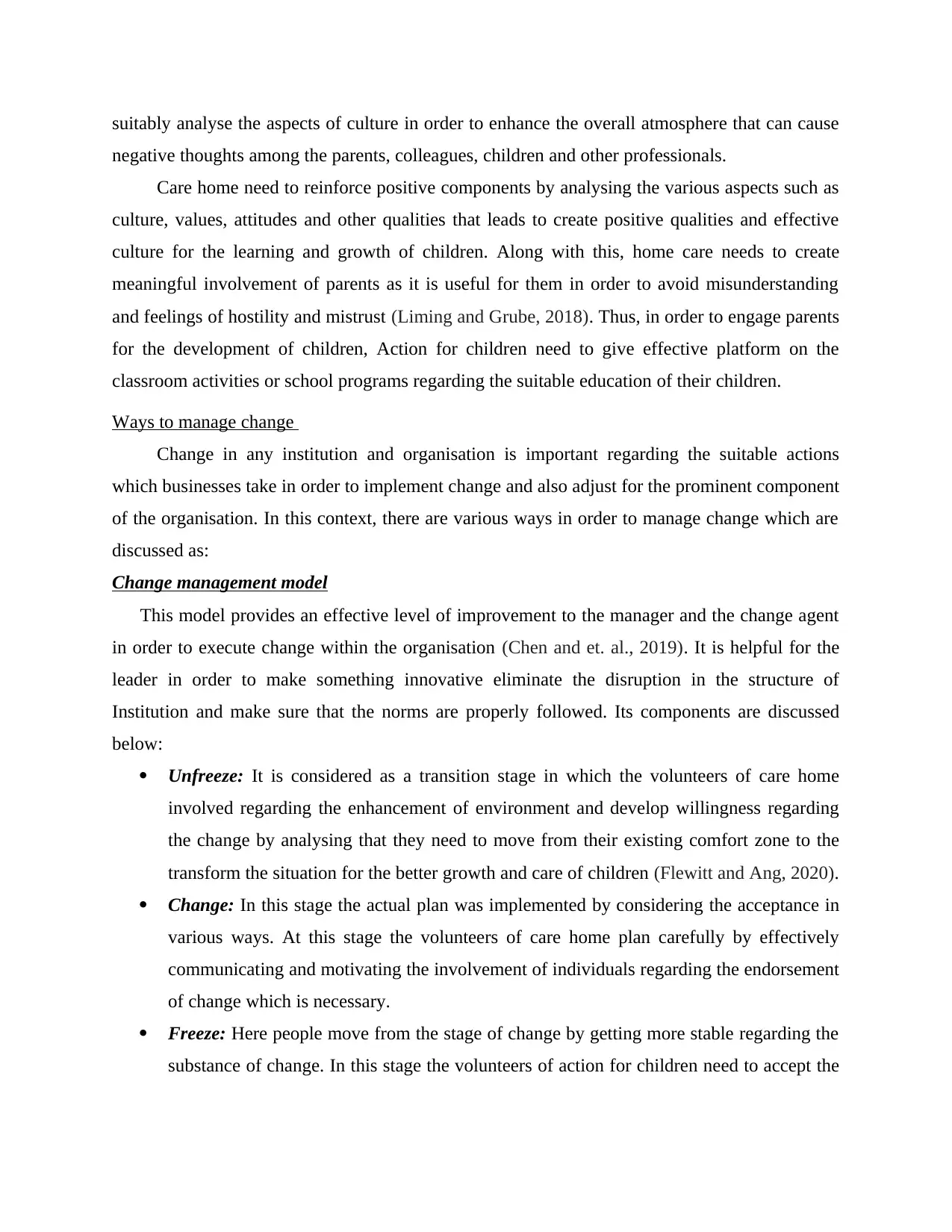
suitably analyse the aspects of culture in order to enhance the overall atmosphere that can cause
negative thoughts among the parents, colleagues, children and other professionals.
Care home need to reinforce positive components by analysing the various aspects such as
culture, values, attitudes and other qualities that leads to create positive qualities and effective
culture for the learning and growth of children. Along with this, home care needs to create
meaningful involvement of parents as it is useful for them in order to avoid misunderstanding
and feelings of hostility and mistrust (Liming and Grube, 2018). Thus, in order to engage parents
for the development of children, Action for children need to give effective platform on the
classroom activities or school programs regarding the suitable education of their children.
Ways to manage change
Change in any institution and organisation is important regarding the suitable actions
which businesses take in order to implement change and also adjust for the prominent component
of the organisation. In this context, there are various ways in order to manage change which are
discussed as:
Change management model
This model provides an effective level of improvement to the manager and the change agent
in order to execute change within the organisation (Chen and et. al., 2019). It is helpful for the
leader in order to make something innovative eliminate the disruption in the structure of
Institution and make sure that the norms are properly followed. Its components are discussed
below:
Unfreeze: It is considered as a transition stage in which the volunteers of care home
involved regarding the enhancement of environment and develop willingness regarding
the change by analysing that they need to move from their existing comfort zone to the
transform the situation for the better growth and care of children (Flewitt and Ang, 2020).
Change: In this stage the actual plan was implemented by considering the acceptance in
various ways. At this stage the volunteers of care home plan carefully by effectively
communicating and motivating the involvement of individuals regarding the endorsement
of change which is necessary.
Freeze: Here people move from the stage of change by getting more stable regarding the
substance of change. In this stage the volunteers of action for children need to accept the
negative thoughts among the parents, colleagues, children and other professionals.
Care home need to reinforce positive components by analysing the various aspects such as
culture, values, attitudes and other qualities that leads to create positive qualities and effective
culture for the learning and growth of children. Along with this, home care needs to create
meaningful involvement of parents as it is useful for them in order to avoid misunderstanding
and feelings of hostility and mistrust (Liming and Grube, 2018). Thus, in order to engage parents
for the development of children, Action for children need to give effective platform on the
classroom activities or school programs regarding the suitable education of their children.
Ways to manage change
Change in any institution and organisation is important regarding the suitable actions
which businesses take in order to implement change and also adjust for the prominent component
of the organisation. In this context, there are various ways in order to manage change which are
discussed as:
Change management model
This model provides an effective level of improvement to the manager and the change agent
in order to execute change within the organisation (Chen and et. al., 2019). It is helpful for the
leader in order to make something innovative eliminate the disruption in the structure of
Institution and make sure that the norms are properly followed. Its components are discussed
below:
Unfreeze: It is considered as a transition stage in which the volunteers of care home
involved regarding the enhancement of environment and develop willingness regarding
the change by analysing that they need to move from their existing comfort zone to the
transform the situation for the better growth and care of children (Flewitt and Ang, 2020).
Change: In this stage the actual plan was implemented by considering the acceptance in
various ways. At this stage the volunteers of care home plan carefully by effectively
communicating and motivating the involvement of individuals regarding the endorsement
of change which is necessary.
Freeze: Here people move from the stage of change by getting more stable regarding the
substance of change. In this stage the volunteers of action for children need to accept the
Secure Best Marks with AI Grader
Need help grading? Try our AI Grader for instant feedback on your assignments.
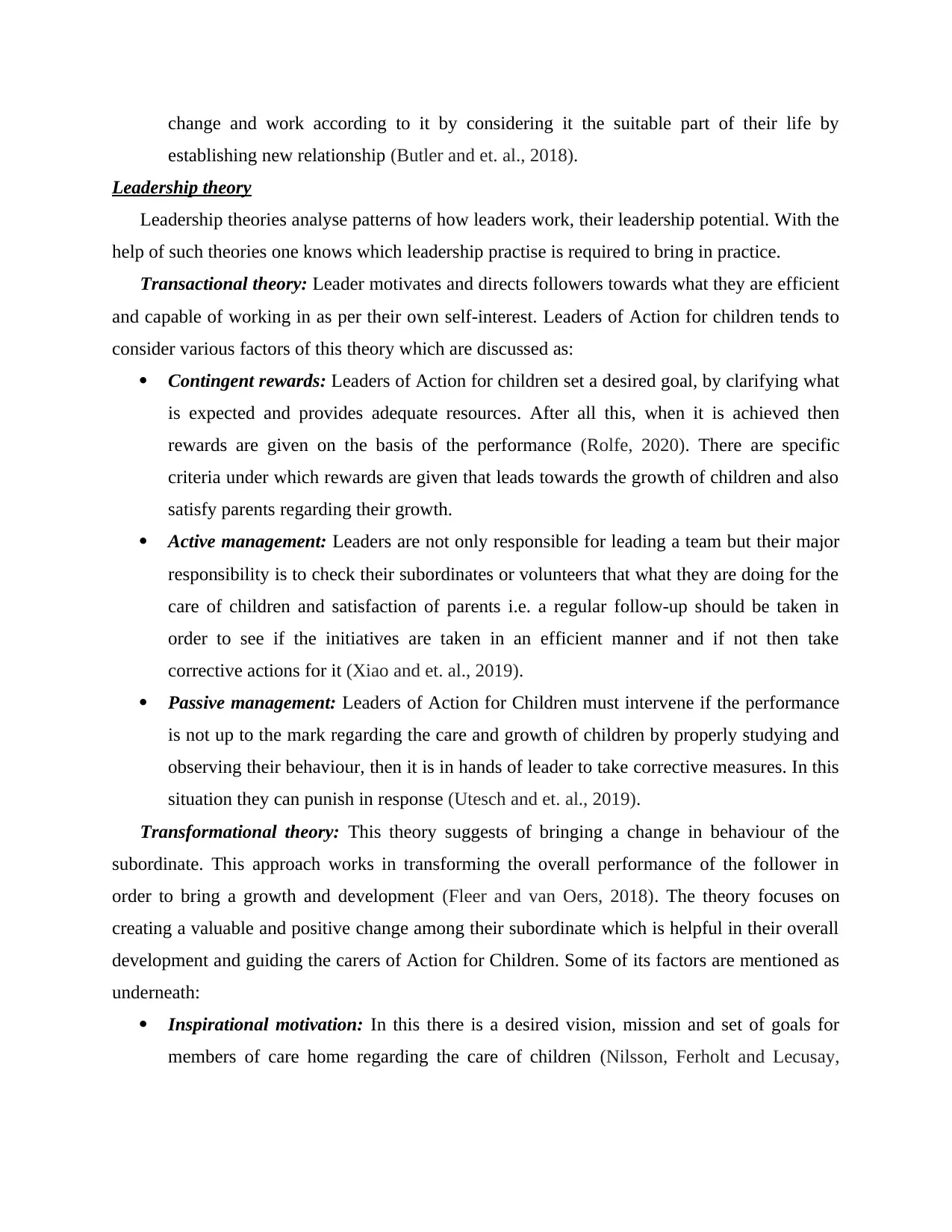
change and work according to it by considering it the suitable part of their life by
establishing new relationship (Butler and et. al., 2018).
Leadership theory
Leadership theories analyse patterns of how leaders work, their leadership potential. With the
help of such theories one knows which leadership practise is required to bring in practice.
Transactional theory: Leader motivates and directs followers towards what they are efficient
and capable of working in as per their own self-interest. Leaders of Action for children tends to
consider various factors of this theory which are discussed as:
Contingent rewards: Leaders of Action for children set a desired goal, by clarifying what
is expected and provides adequate resources. After all this, when it is achieved then
rewards are given on the basis of the performance (Rolfe, 2020). There are specific
criteria under which rewards are given that leads towards the growth of children and also
satisfy parents regarding their growth.
Active management: Leaders are not only responsible for leading a team but their major
responsibility is to check their subordinates or volunteers that what they are doing for the
care of children and satisfaction of parents i.e. a regular follow-up should be taken in
order to see if the initiatives are taken in an efficient manner and if not then take
corrective actions for it (Xiao and et. al., 2019).
Passive management: Leaders of Action for Children must intervene if the performance
is not up to the mark regarding the care and growth of children by properly studying and
observing their behaviour, then it is in hands of leader to take corrective measures. In this
situation they can punish in response (Utesch and et. al., 2019).
Transformational theory: This theory suggests of bringing a change in behaviour of the
subordinate. This approach works in transforming the overall performance of the follower in
order to bring a growth and development (Fleer and van Oers, 2018). The theory focuses on
creating a valuable and positive change among their subordinate which is helpful in their overall
development and guiding the carers of Action for Children. Some of its factors are mentioned as
underneath:
Inspirational motivation: In this there is a desired vision, mission and set of goals for
members of care home regarding the care of children (Nilsson, Ferholt and Lecusay,
establishing new relationship (Butler and et. al., 2018).
Leadership theory
Leadership theories analyse patterns of how leaders work, their leadership potential. With the
help of such theories one knows which leadership practise is required to bring in practice.
Transactional theory: Leader motivates and directs followers towards what they are efficient
and capable of working in as per their own self-interest. Leaders of Action for children tends to
consider various factors of this theory which are discussed as:
Contingent rewards: Leaders of Action for children set a desired goal, by clarifying what
is expected and provides adequate resources. After all this, when it is achieved then
rewards are given on the basis of the performance (Rolfe, 2020). There are specific
criteria under which rewards are given that leads towards the growth of children and also
satisfy parents regarding their growth.
Active management: Leaders are not only responsible for leading a team but their major
responsibility is to check their subordinates or volunteers that what they are doing for the
care of children and satisfaction of parents i.e. a regular follow-up should be taken in
order to see if the initiatives are taken in an efficient manner and if not then take
corrective actions for it (Xiao and et. al., 2019).
Passive management: Leaders of Action for Children must intervene if the performance
is not up to the mark regarding the care and growth of children by properly studying and
observing their behaviour, then it is in hands of leader to take corrective measures. In this
situation they can punish in response (Utesch and et. al., 2019).
Transformational theory: This theory suggests of bringing a change in behaviour of the
subordinate. This approach works in transforming the overall performance of the follower in
order to bring a growth and development (Fleer and van Oers, 2018). The theory focuses on
creating a valuable and positive change among their subordinate which is helpful in their overall
development and guiding the carers of Action for Children. Some of its factors are mentioned as
underneath:
Inspirational motivation: In this there is a desired vision, mission and set of goals for
members of care home regarding the care of children (Nilsson, Ferholt and Lecusay,
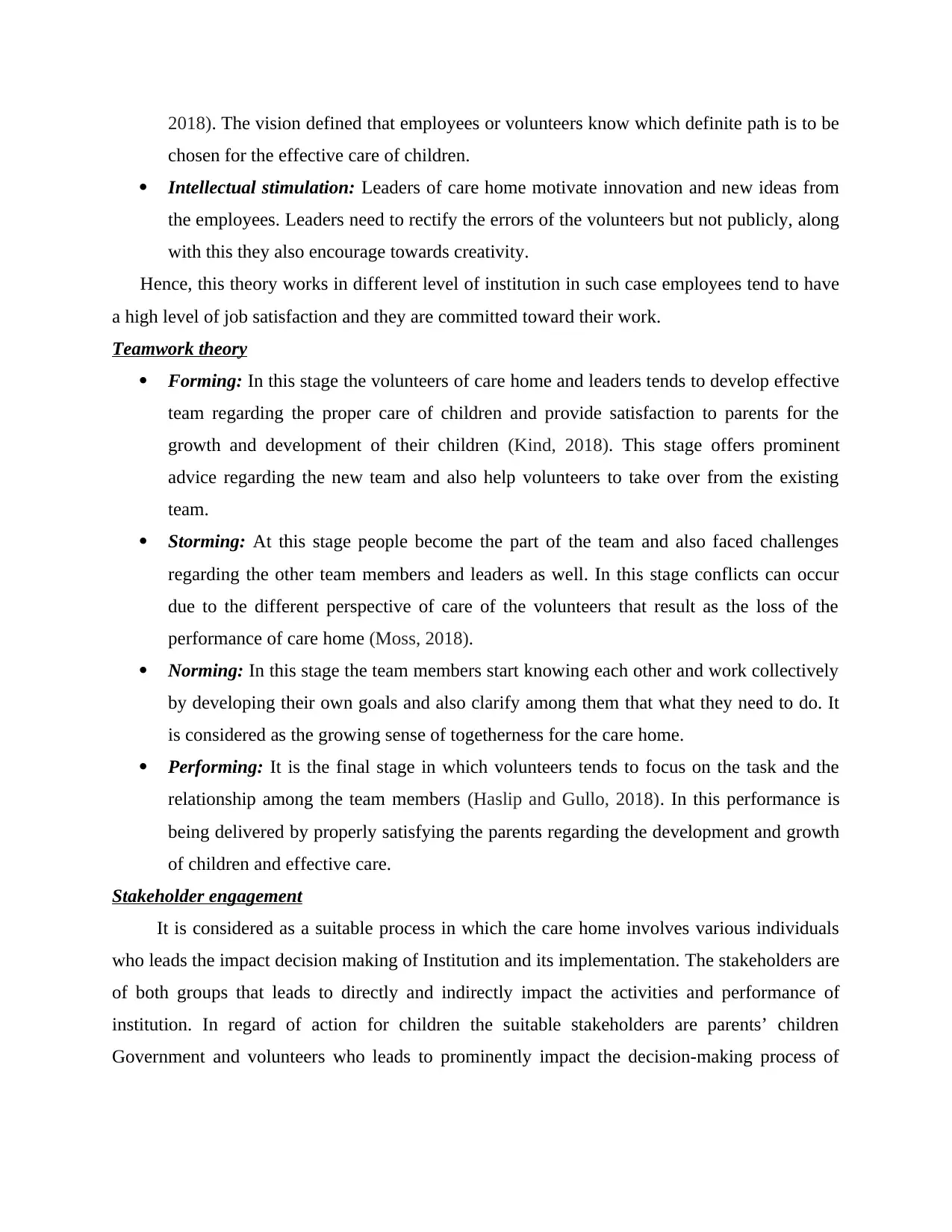
2018). The vision defined that employees or volunteers know which definite path is to be
chosen for the effective care of children.
Intellectual stimulation: Leaders of care home motivate innovation and new ideas from
the employees. Leaders need to rectify the errors of the volunteers but not publicly, along
with this they also encourage towards creativity.
Hence, this theory works in different level of institution in such case employees tend to have
a high level of job satisfaction and they are committed toward their work.
Teamwork theory
Forming: In this stage the volunteers of care home and leaders tends to develop effective
team regarding the proper care of children and provide satisfaction to parents for the
growth and development of their children (Kind, 2018). This stage offers prominent
advice regarding the new team and also help volunteers to take over from the existing
team.
Storming: At this stage people become the part of the team and also faced challenges
regarding the other team members and leaders as well. In this stage conflicts can occur
due to the different perspective of care of the volunteers that result as the loss of the
performance of care home (Moss, 2018).
Norming: In this stage the team members start knowing each other and work collectively
by developing their own goals and also clarify among them that what they need to do. It
is considered as the growing sense of togetherness for the care home.
Performing: It is the final stage in which volunteers tends to focus on the task and the
relationship among the team members (Haslip and Gullo, 2018). In this performance is
being delivered by properly satisfying the parents regarding the development and growth
of children and effective care.
Stakeholder engagement
It is considered as a suitable process in which the care home involves various individuals
who leads the impact decision making of Institution and its implementation. The stakeholders are
of both groups that leads to directly and indirectly impact the activities and performance of
institution. In regard of action for children the suitable stakeholders are parents’ children
Government and volunteers who leads to prominently impact the decision-making process of
chosen for the effective care of children.
Intellectual stimulation: Leaders of care home motivate innovation and new ideas from
the employees. Leaders need to rectify the errors of the volunteers but not publicly, along
with this they also encourage towards creativity.
Hence, this theory works in different level of institution in such case employees tend to have
a high level of job satisfaction and they are committed toward their work.
Teamwork theory
Forming: In this stage the volunteers of care home and leaders tends to develop effective
team regarding the proper care of children and provide satisfaction to parents for the
growth and development of their children (Kind, 2018). This stage offers prominent
advice regarding the new team and also help volunteers to take over from the existing
team.
Storming: At this stage people become the part of the team and also faced challenges
regarding the other team members and leaders as well. In this stage conflicts can occur
due to the different perspective of care of the volunteers that result as the loss of the
performance of care home (Moss, 2018).
Norming: In this stage the team members start knowing each other and work collectively
by developing their own goals and also clarify among them that what they need to do. It
is considered as the growing sense of togetherness for the care home.
Performing: It is the final stage in which volunteers tends to focus on the task and the
relationship among the team members (Haslip and Gullo, 2018). In this performance is
being delivered by properly satisfying the parents regarding the development and growth
of children and effective care.
Stakeholder engagement
It is considered as a suitable process in which the care home involves various individuals
who leads the impact decision making of Institution and its implementation. The stakeholders are
of both groups that leads to directly and indirectly impact the activities and performance of
institution. In regard of action for children the suitable stakeholders are parents’ children
Government and volunteers who leads to prominently impact the decision-making process of
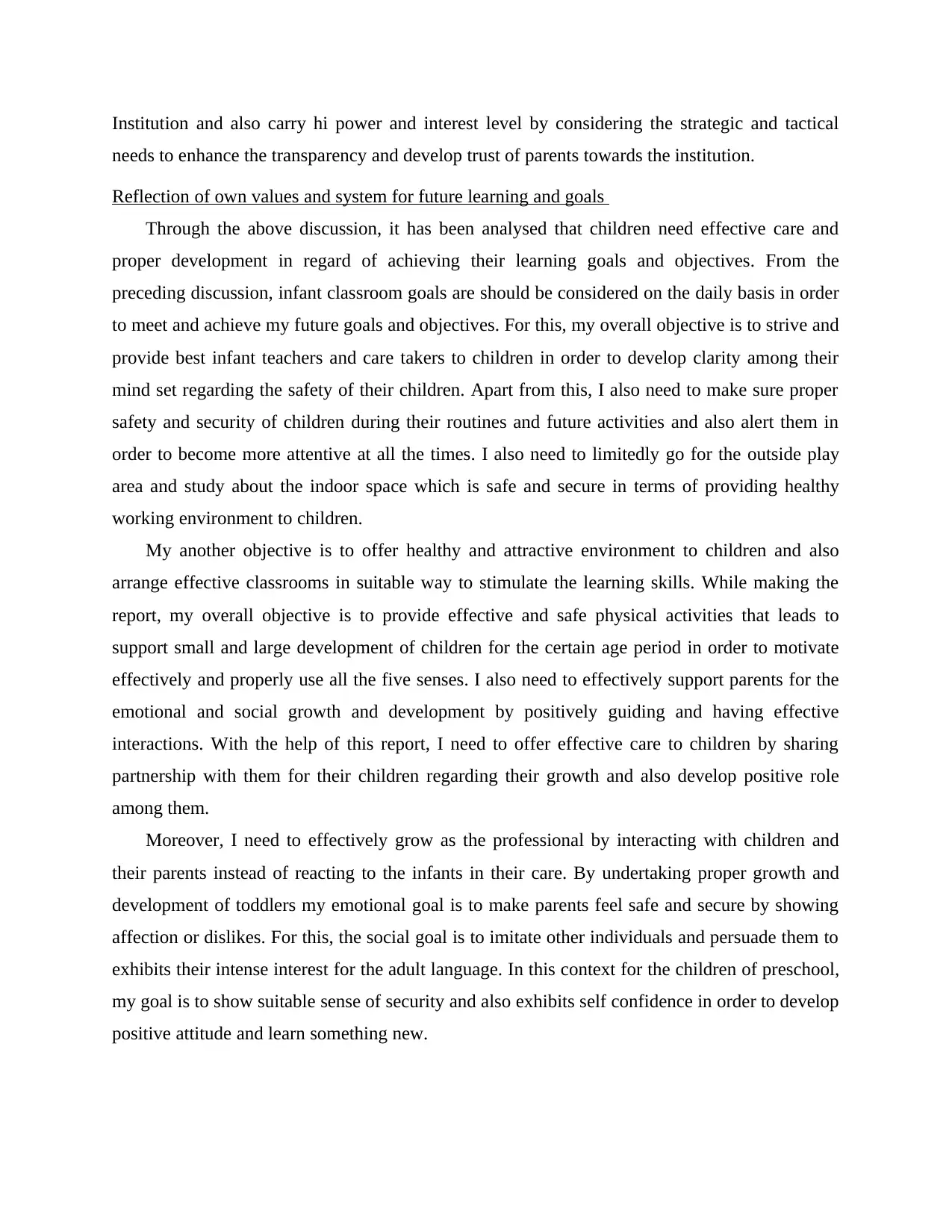
Institution and also carry hi power and interest level by considering the strategic and tactical
needs to enhance the transparency and develop trust of parents towards the institution.
Reflection of own values and system for future learning and goals
Through the above discussion, it has been analysed that children need effective care and
proper development in regard of achieving their learning goals and objectives. From the
preceding discussion, infant classroom goals are should be considered on the daily basis in order
to meet and achieve my future goals and objectives. For this, my overall objective is to strive and
provide best infant teachers and care takers to children in order to develop clarity among their
mind set regarding the safety of their children. Apart from this, I also need to make sure proper
safety and security of children during their routines and future activities and also alert them in
order to become more attentive at all the times. I also need to limitedly go for the outside play
area and study about the indoor space which is safe and secure in terms of providing healthy
working environment to children.
My another objective is to offer healthy and attractive environment to children and also
arrange effective classrooms in suitable way to stimulate the learning skills. While making the
report, my overall objective is to provide effective and safe physical activities that leads to
support small and large development of children for the certain age period in order to motivate
effectively and properly use all the five senses. I also need to effectively support parents for the
emotional and social growth and development by positively guiding and having effective
interactions. With the help of this report, I need to offer effective care to children by sharing
partnership with them for their children regarding their growth and also develop positive role
among them.
Moreover, I need to effectively grow as the professional by interacting with children and
their parents instead of reacting to the infants in their care. By undertaking proper growth and
development of toddlers my emotional goal is to make parents feel safe and secure by showing
affection or dislikes. For this, the social goal is to imitate other individuals and persuade them to
exhibits their intense interest for the adult language. In this context for the children of preschool,
my goal is to show suitable sense of security and also exhibits self confidence in order to develop
positive attitude and learn something new.
needs to enhance the transparency and develop trust of parents towards the institution.
Reflection of own values and system for future learning and goals
Through the above discussion, it has been analysed that children need effective care and
proper development in regard of achieving their learning goals and objectives. From the
preceding discussion, infant classroom goals are should be considered on the daily basis in order
to meet and achieve my future goals and objectives. For this, my overall objective is to strive and
provide best infant teachers and care takers to children in order to develop clarity among their
mind set regarding the safety of their children. Apart from this, I also need to make sure proper
safety and security of children during their routines and future activities and also alert them in
order to become more attentive at all the times. I also need to limitedly go for the outside play
area and study about the indoor space which is safe and secure in terms of providing healthy
working environment to children.
My another objective is to offer healthy and attractive environment to children and also
arrange effective classrooms in suitable way to stimulate the learning skills. While making the
report, my overall objective is to provide effective and safe physical activities that leads to
support small and large development of children for the certain age period in order to motivate
effectively and properly use all the five senses. I also need to effectively support parents for the
emotional and social growth and development by positively guiding and having effective
interactions. With the help of this report, I need to offer effective care to children by sharing
partnership with them for their children regarding their growth and also develop positive role
among them.
Moreover, I need to effectively grow as the professional by interacting with children and
their parents instead of reacting to the infants in their care. By undertaking proper growth and
development of toddlers my emotional goal is to make parents feel safe and secure by showing
affection or dislikes. For this, the social goal is to imitate other individuals and persuade them to
exhibits their intense interest for the adult language. In this context for the children of preschool,
my goal is to show suitable sense of security and also exhibits self confidence in order to develop
positive attitude and learn something new.
Paraphrase This Document
Need a fresh take? Get an instant paraphrase of this document with our AI Paraphraser
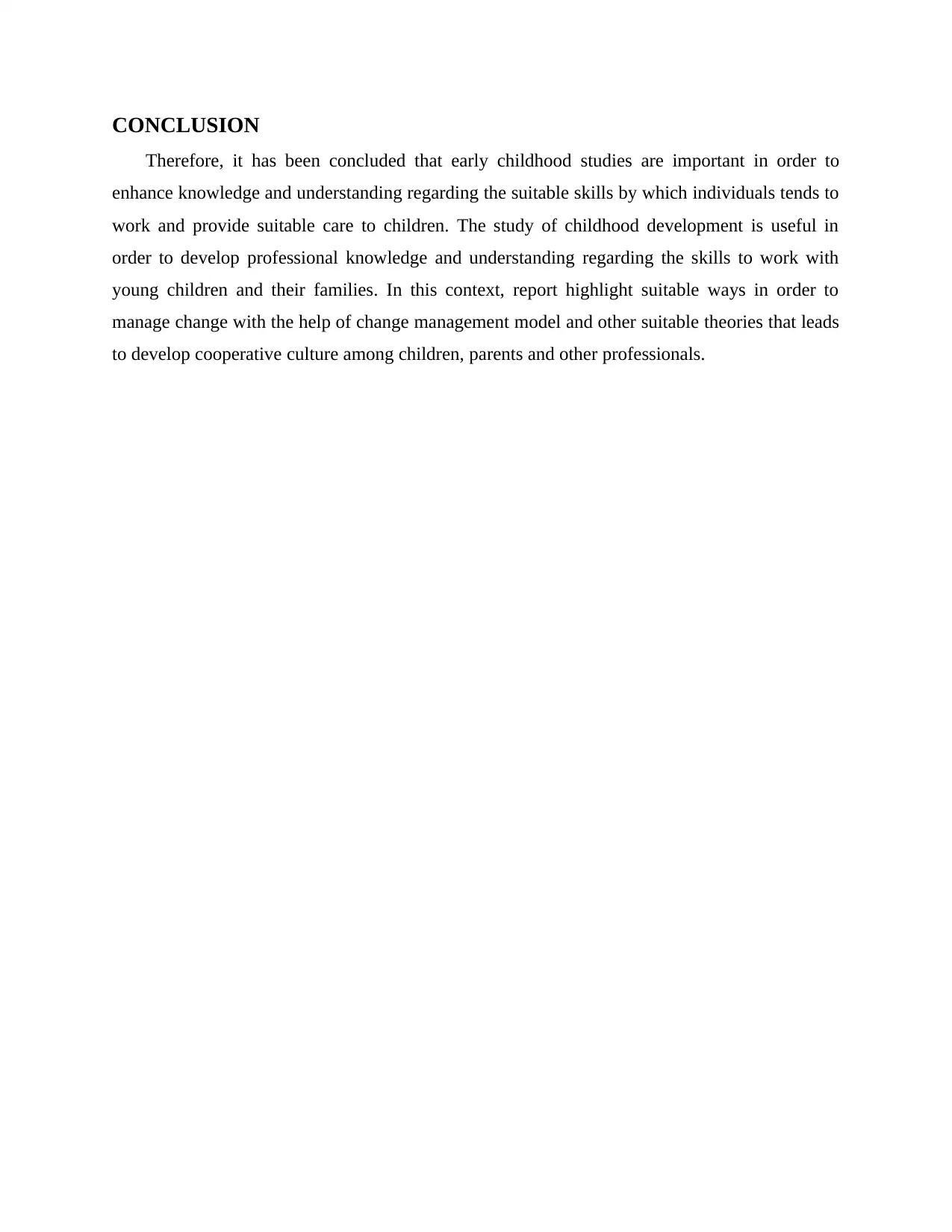
CONCLUSION
Therefore, it has been concluded that early childhood studies are important in order to
enhance knowledge and understanding regarding the suitable skills by which individuals tends to
work and provide suitable care to children. The study of childhood development is useful in
order to develop professional knowledge and understanding regarding the skills to work with
young children and their families. In this context, report highlight suitable ways in order to
manage change with the help of change management model and other suitable theories that leads
to develop cooperative culture among children, parents and other professionals.
Therefore, it has been concluded that early childhood studies are important in order to
enhance knowledge and understanding regarding the suitable skills by which individuals tends to
work and provide suitable care to children. The study of childhood development is useful in
order to develop professional knowledge and understanding regarding the skills to work with
young children and their families. In this context, report highlight suitable ways in order to
manage change with the help of change management model and other suitable theories that leads
to develop cooperative culture among children, parents and other professionals.
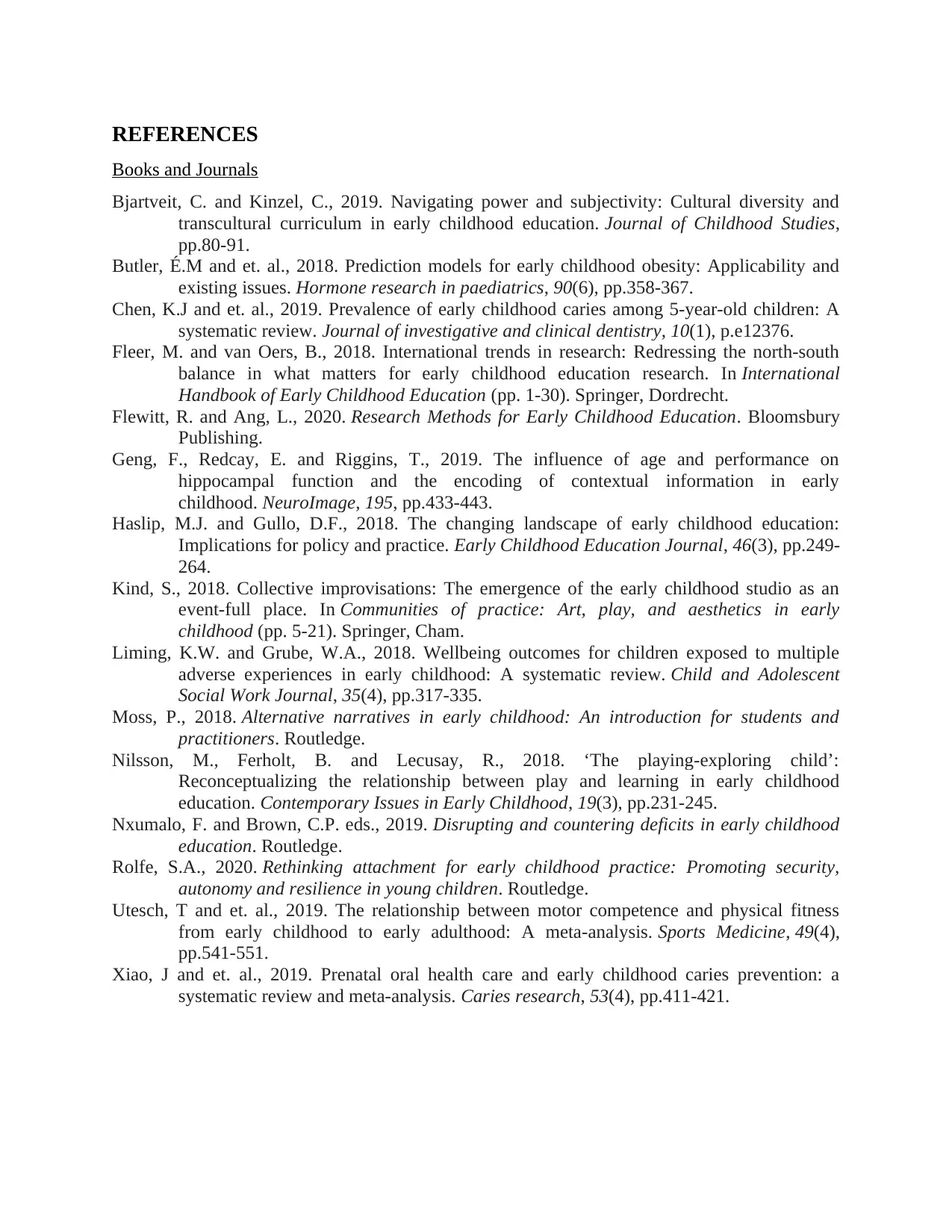
REFERENCES
Books and Journals
Bjartveit, C. and Kinzel, C., 2019. Navigating power and subjectivity: Cultural diversity and
transcultural curriculum in early childhood education. Journal of Childhood Studies,
pp.80-91.
Butler, É.M and et. al., 2018. Prediction models for early childhood obesity: Applicability and
existing issues. Hormone research in paediatrics, 90(6), pp.358-367.
Chen, K.J and et. al., 2019. Prevalence of early childhood caries among 5‐year‐old children: A
systematic review. Journal of investigative and clinical dentistry, 10(1), p.e12376.
Fleer, M. and van Oers, B., 2018. International trends in research: Redressing the north-south
balance in what matters for early childhood education research. In International
Handbook of Early Childhood Education (pp. 1-30). Springer, Dordrecht.
Flewitt, R. and Ang, L., 2020. Research Methods for Early Childhood Education. Bloomsbury
Publishing.
Geng, F., Redcay, E. and Riggins, T., 2019. The influence of age and performance on
hippocampal function and the encoding of contextual information in early
childhood. NeuroImage, 195, pp.433-443.
Haslip, M.J. and Gullo, D.F., 2018. The changing landscape of early childhood education:
Implications for policy and practice. Early Childhood Education Journal, 46(3), pp.249-
264.
Kind, S., 2018. Collective improvisations: The emergence of the early childhood studio as an
event-full place. In Communities of practice: Art, play, and aesthetics in early
childhood (pp. 5-21). Springer, Cham.
Liming, K.W. and Grube, W.A., 2018. Wellbeing outcomes for children exposed to multiple
adverse experiences in early childhood: A systematic review. Child and Adolescent
Social Work Journal, 35(4), pp.317-335.
Moss, P., 2018. Alternative narratives in early childhood: An introduction for students and
practitioners. Routledge.
Nilsson, M., Ferholt, B. and Lecusay, R., 2018. ‘The playing-exploring child’:
Reconceptualizing the relationship between play and learning in early childhood
education. Contemporary Issues in Early Childhood, 19(3), pp.231-245.
Nxumalo, F. and Brown, C.P. eds., 2019. Disrupting and countering deficits in early childhood
education. Routledge.
Rolfe, S.A., 2020. Rethinking attachment for early childhood practice: Promoting security,
autonomy and resilience in young children. Routledge.
Utesch, T and et. al., 2019. The relationship between motor competence and physical fitness
from early childhood to early adulthood: A meta-analysis. Sports Medicine, 49(4),
pp.541-551.
Xiao, J and et. al., 2019. Prenatal oral health care and early childhood caries prevention: a
systematic review and meta-analysis. Caries research, 53(4), pp.411-421.
Books and Journals
Bjartveit, C. and Kinzel, C., 2019. Navigating power and subjectivity: Cultural diversity and
transcultural curriculum in early childhood education. Journal of Childhood Studies,
pp.80-91.
Butler, É.M and et. al., 2018. Prediction models for early childhood obesity: Applicability and
existing issues. Hormone research in paediatrics, 90(6), pp.358-367.
Chen, K.J and et. al., 2019. Prevalence of early childhood caries among 5‐year‐old children: A
systematic review. Journal of investigative and clinical dentistry, 10(1), p.e12376.
Fleer, M. and van Oers, B., 2018. International trends in research: Redressing the north-south
balance in what matters for early childhood education research. In International
Handbook of Early Childhood Education (pp. 1-30). Springer, Dordrecht.
Flewitt, R. and Ang, L., 2020. Research Methods for Early Childhood Education. Bloomsbury
Publishing.
Geng, F., Redcay, E. and Riggins, T., 2019. The influence of age and performance on
hippocampal function and the encoding of contextual information in early
childhood. NeuroImage, 195, pp.433-443.
Haslip, M.J. and Gullo, D.F., 2018. The changing landscape of early childhood education:
Implications for policy and practice. Early Childhood Education Journal, 46(3), pp.249-
264.
Kind, S., 2018. Collective improvisations: The emergence of the early childhood studio as an
event-full place. In Communities of practice: Art, play, and aesthetics in early
childhood (pp. 5-21). Springer, Cham.
Liming, K.W. and Grube, W.A., 2018. Wellbeing outcomes for children exposed to multiple
adverse experiences in early childhood: A systematic review. Child and Adolescent
Social Work Journal, 35(4), pp.317-335.
Moss, P., 2018. Alternative narratives in early childhood: An introduction for students and
practitioners. Routledge.
Nilsson, M., Ferholt, B. and Lecusay, R., 2018. ‘The playing-exploring child’:
Reconceptualizing the relationship between play and learning in early childhood
education. Contemporary Issues in Early Childhood, 19(3), pp.231-245.
Nxumalo, F. and Brown, C.P. eds., 2019. Disrupting and countering deficits in early childhood
education. Routledge.
Rolfe, S.A., 2020. Rethinking attachment for early childhood practice: Promoting security,
autonomy and resilience in young children. Routledge.
Utesch, T and et. al., 2019. The relationship between motor competence and physical fitness
from early childhood to early adulthood: A meta-analysis. Sports Medicine, 49(4),
pp.541-551.
Xiao, J and et. al., 2019. Prenatal oral health care and early childhood caries prevention: a
systematic review and meta-analysis. Caries research, 53(4), pp.411-421.
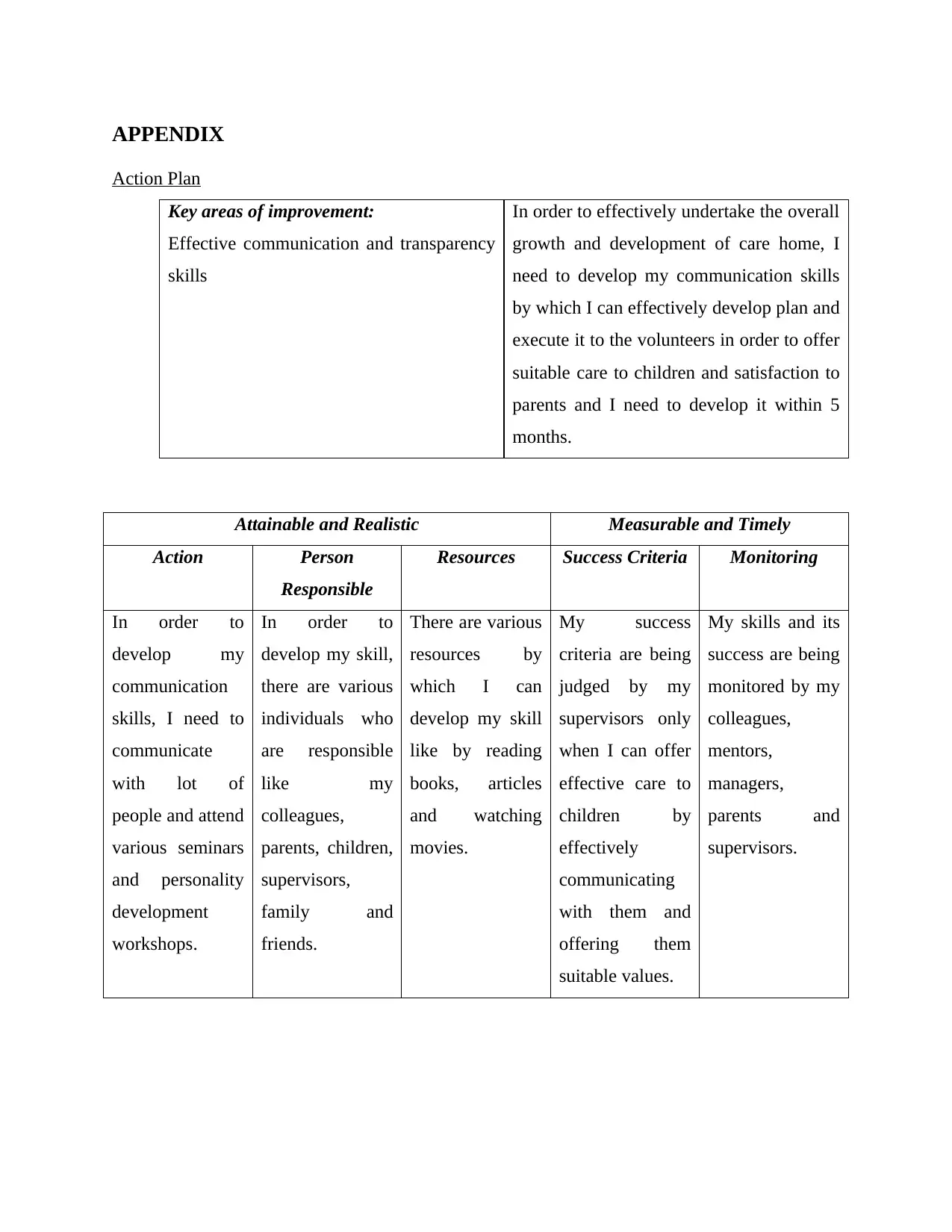
APPENDIX
Action Plan
Key areas of improvement:
Effective communication and transparency
skills
In order to effectively undertake the overall
growth and development of care home, I
need to develop my communication skills
by which I can effectively develop plan and
execute it to the volunteers in order to offer
suitable care to children and satisfaction to
parents and I need to develop it within 5
months.
Attainable and Realistic Measurable and Timely
Action Person
Responsible
Resources Success Criteria Monitoring
In order to
develop my
communication
skills, I need to
communicate
with lot of
people and attend
various seminars
and personality
development
workshops.
In order to
develop my skill,
there are various
individuals who
are responsible
like my
colleagues,
parents, children,
supervisors,
family and
friends.
There are various
resources by
which I can
develop my skill
like by reading
books, articles
and watching
movies.
My success
criteria are being
judged by my
supervisors only
when I can offer
effective care to
children by
effectively
communicating
with them and
offering them
suitable values.
My skills and its
success are being
monitored by my
colleagues,
mentors,
managers,
parents and
supervisors.
Action Plan
Key areas of improvement:
Effective communication and transparency
skills
In order to effectively undertake the overall
growth and development of care home, I
need to develop my communication skills
by which I can effectively develop plan and
execute it to the volunteers in order to offer
suitable care to children and satisfaction to
parents and I need to develop it within 5
months.
Attainable and Realistic Measurable and Timely
Action Person
Responsible
Resources Success Criteria Monitoring
In order to
develop my
communication
skills, I need to
communicate
with lot of
people and attend
various seminars
and personality
development
workshops.
In order to
develop my skill,
there are various
individuals who
are responsible
like my
colleagues,
parents, children,
supervisors,
family and
friends.
There are various
resources by
which I can
develop my skill
like by reading
books, articles
and watching
movies.
My success
criteria are being
judged by my
supervisors only
when I can offer
effective care to
children by
effectively
communicating
with them and
offering them
suitable values.
My skills and its
success are being
monitored by my
colleagues,
mentors,
managers,
parents and
supervisors.
Secure Best Marks with AI Grader
Need help grading? Try our AI Grader for instant feedback on your assignments.

1 out of 11
Related Documents
Your All-in-One AI-Powered Toolkit for Academic Success.
+13062052269
info@desklib.com
Available 24*7 on WhatsApp / Email
![[object Object]](/_next/static/media/star-bottom.7253800d.svg)
Unlock your academic potential
© 2024 | Zucol Services PVT LTD | All rights reserved.





